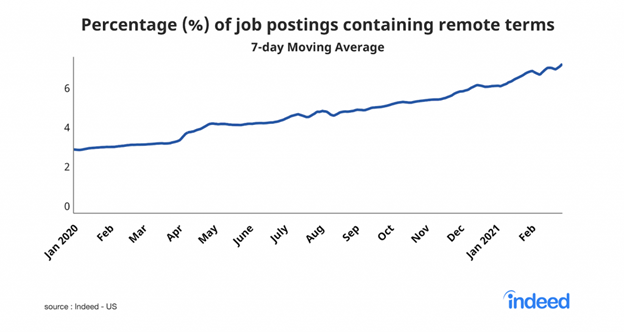If companies unanimously said “yes” to pandemic telework, it is not because they spontaneously discovered the virtues of working remotely… but because they wanted to do their part to fight the virus – by following public health guidelines.
And so, until recently, few companies had announced an intention to switch to an “all-virtual” mode after the pandemic.
In an October 2020 survey conducted by the Canadian Federation of Independent Business, 64% of executives felt that telework was not appropriate for their business model. According to another survey, this time from the HBR, 40% of managers admitted to having trouble leading a team remotely.
Anecdotally, as a journalist, most of the business leaders I interviewed this year for Isarta Infos continued to recruit on a geographic basis, with a view of returning to the office post pandemic. Usually the most popular “post-pandemic” option is a hybrid of home and office workdays or even a “free choice” policy.
Is it the worsening of the labour shortage that is now starting to be felt? It seems that employees are starting to change their minds on the issue. Some indicators now give the impression that they are ready to seriously consider the option of “remote” recruitment.
Getting out of New York and the big cities
The shortage of IT professionals is well known. And the pandemic has only exacerbated the problem, with the acceleration of companies’ digital shift. On the other hand, the recovery seems to be well underway. An article by Forbes reports the analysis of Steven Jiang, President and CEO of the Hiretual application, who observed a significant increase in talent requests on his platform from October 2020.
A finding that emerges from the analysis of his requests is that recruiters are now looking outside their natural recruitment pools which are the east coast (New York) and the west coast (Silicon Valley, San Francisco, Seattle). Recruiters advertise in medium-sized cities in the Detroit, Cincinnati and St-Louis area, while they usually focused their research in cities known for their technological expertise.
According to the article, the president of Hiretual says that the companies:
now recognize remote working as an acceptable recruitment alternative to full-time office presence. So, recruiters are looking for talent in smaller cities and also abroad.”
Another sign of an openness of employers to consider remote working as a valid recruitment option is a significant increase in job postings offering the possibility of remote working. A probe from Indeed lab revealed that job postings mentioning “remote work” or “telework” more than doubled in one year, going from 2.9% in January 2020 to 6.9% in February 2021.
Most striking, according to the survey analysis, is that the remote job postings share has continued to rise even as many workers have returned to the office. In fact, the increase in remote work accelerated in early 2021 even after accounting for the April 2020 change in our job posting form.”

Source: Indeed Lab
A growing want to “stay at home”
In a survey conducted by SOM in the Gatineau region in early 2021, 44% of teleworkers surveyed said they wanted to stay at home “full time or almost full time” after the pandemic. In the United States, it is teleworking parents who say loud and clear – 61%, according to a FlexJobs survey – that they too want to stay in “full time”, otherwise they will leave their jobs.
Closer to home, Tania Saba, a professor at the University of Montreal’s School of Industrial Relations, is currently conducting a survey on return-to-work conditions and, according to preliminary results, two out of three workers (66 %) want “to continue working remotely”, whereas opinions were divided more of less 50% last September.
[Telework] was a big revelation for most workers, including managers, says Ms. Saba. The more people have experienced teleworking over the months, the more they have liked this way of organizing work that has gone from an urgent situation to a certain normality”, explains Tania Saba.




